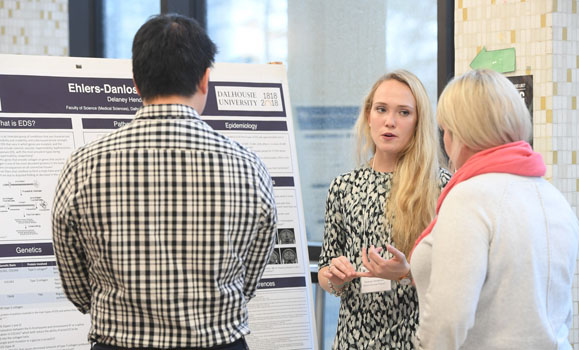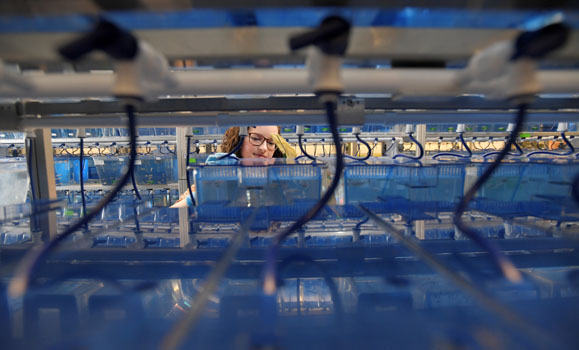To celebrate Dal’s 200th anniversary, Dalhousie Research Services is providing an inside look at the remarkable research happening right here at our university. We begin our series of monthly profiles with our Faculty of Medicine, where world-class researchers are improving health care and helping us all live healthier lives.
From neuroscience to vaccinology, cancer research to drug development, Dalhousie Medical School is a major contributor to the world’s medical knowledge.
The incredibly innovative work being done by the researchers that call this faculty home has led to amazing advancements in medicine — many of which are being made right here in the Maritimes.
Researchers like Jean Marshall from Dal’s Department of Microbiology and Immunology.
Dr. Marshall is at the forefront of discovering new ways to defend ourselves against disease. By working with mast cells, which are immune cells that regulate inflammatory responses, her team is exploring how our own immune system can be used to fight cancer, infection, and chronic inflammatory diseases.
And Dr. Alex Quinn from the Department of Physiology and Biophysics.
Dr. Quinn has shown for the first time that scar tissue in damaged parts of the heart can still electronically connect with healthy tissue. Dr. Quinn’s work has really turned the current understanding of the heart’s electrical activity on its head, and may open the door to much needed improvements in treating many cardiac diseases.
And Dr. James Robar from the Department of Radiation Oncology.
Dr. Robar and his team are developing and improving technologies that allow doctors to deploy radiation treatment in more precise and less-invasive ways that improve patient outcomes.
That’s just three examples from a faculty that is celebrating its 150th anniversary this year and has over 2,000 members.
The research happening here provides our health0care providers and policymakers with the solid information that is essential for making real improvements to clinical practice, health service delivery and public health policy.
“Evidence is the cornerstone of effective and efficient delivery of healthcare,” says Dr. Roger McLeod, associate dean of research for the Faculty of Medicine. “From new discoveries at the molecular and cellular level to implementation in the clinic and the community, Dalhousie medical researchers are central to maintaining health over the lifespan and treating illness when it arises in our population. In addition, our relevance and impact extends far outside our region.”
Training the next generation of doctors
Dalhousie Medical School consists of over 1,000 medical students, graduate students and residents.
Because research is such a critical part of this field, it has been embedded in the Medical Doctor (MD) curriculum. Medical students are introduced to research at the beginning of their training through the Research in Medicine program. The program — a first of its kind in Canada — is designed to give graduates a thorough understanding of the vital role that research plays in today’s health-care system.

Students present their work at the Research in Medicine Capstone Symposium.
"Modern physicians need more than strong clinical competencies,” says Dr. Ronald George, associate professor in the Department of Anesthesia, Pain Management and Perioperative Medicine. “Medicine is a partnership with unfolding knowledge and uncertain truths.”
First-year students are paired with faculty mentors to work on research projects that cover a wide range of topics. This includes addressing the needs of Maritime homeless populations; designing safer treatments for cancer; developing interventions for early autism; coming up with ideas that improve outcomes in spinal cord injuries and much more.
By the end of their fourth year, students present their research projects at a conference of their choosing and submit a report for publication in a peer-reviewed journal.
“The Research in Medicine (RIM) program fosters a culture of inquiry among students and faculty,” says Dr. George. “It provides our new physicians with the skills they need to be independent and critical thinkers, capable of appraising evidence, and adapting to new knowledge.”
State-of-the-art multi-user research facilities
Looking for access to sophisticated equipment and facilities?
Dal’s Faculty of Medicine offers a range of core, multi-user research facilities maintained and operated by trained experts. The research facilities that fall under the CORES (Centralized Operations of Research Equipment and Supports) program are designed to serve the needs of many different researchers providing high-tech equipment and lab space for a variety of basic, clinical and applied research applications.
At the Zebrafish Core Facility, for instance, researchers can develop and study zebrafish models of disease, and test potential new treatments in these disease models.

Student Corey Filiaggi works in the Zebrafish Core Facility.
One of the researchers who is taking advantage of this state-of-the-art facility is Dr. Christopher McMaster, head of Dalhousie’s Department of Pharmacology. Dr. McMaster’s research focuses on orphan diseases, which are incredibly rare and have not been a priority for the major pharmaceutical companies. His work will enable the development of drugs for muscular dystrophy, inherited Parkinson’s disease, and a rare childhood blinding disease called familial exudative vitreoretinopathy, or FEVR.
The zebrafish facility is a critical part of Dr. McMaster’s work, because zebrafish share many genes with humans, so they’re excellent models for testing the safety and efficacy of treatments.
In addition to the Zebrafish Core Facility, Dalhousie Faculty of Medicine has five other CORES facilities. They include:
- Enhanced Gene Analysis & Discovery Facility
- Flow Cytometry Facility
- Maritime Brain Tissue Bank
- Proteomics & Mass Spectrometry Facility
- Cellular and Molecular Digital Imaging Facility
“Dalhousie has truly exceptional researchers and we need to provide them with all the supports that will allow them to continue to be world-class,” says Carla Ross, director of research development in the Faculty of Medicine and managing director of CORES. “Having access to the equipment and expertise in these facilities, makes all the difference to our faculty.”
Collaborative, innovative solutions
The type of innovative research being done by dal’s Faculty of Medicine would not be possible without strong relationships with partners in government and a number of different industries.
The Faculty’s researchers hold a multitude of innovative patents, and many have already launched or are in in the process of launching commercialization projects and spin-off companies. Treventis, DeNovaMed, DeCell Technologies, Mindful Scientific, and 3D Bolus (to name a few), are helping Nova Scotia lead the way in developing innovative solutions to health-care problems.
To learn more about the research happening at the Faculty of Medicine, check out the Faculty’s new strategic plan, #DalMedForward, or visit its website.
All researchers at Dalhousie are supported by the federal Research Support Fund (RSF) program. RSF helps Canadian universities and colleges, along with their affiliated health research institutes and research hospitals, with the indirect costs associated with federally-funded research.

